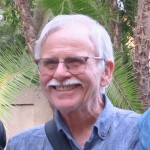UCLA faculty remember Charles Goodwin for making strides in researchers’ understanding of human speech.
Goodwin, a distinguished professor emeritus in the department of applied linguistics, died on March 31 due to cancer. He was 74.
Goodwin and his wife, Marjorie Goodwin, professor emerita in the department of anthropology, started working at UCLA in 1996. The couple established weekly “Discourse Lab” meetings where he would showcase videos of regular human interaction he had collected and share his analysis with faculty members, graduate students and visiting professors.
Pauline Beaupoil-Hourdel, a lecturer in Université Sorbonne Nouvelle who used to participate in Goodwin’s lab, said one of his videos included Goodwin’s father, who suffered from aphasia, a condition in which a person loses the ability to express or understand speech. These videos showed how people conveyed conversation when they could not use words, she said.
“He helped me (understand) how (the way) language was produced was linked to the context and interaction,” Beaupoil-Hourdel said.
Jacob Foster, an assistant professor in the department of sociology, attended the labs together with his wife and said Goodwin’s video collection reflects his curiosity and analytical abilities.
“He (had this) completely insatiable curiosity and love for the world,” he said. “You could look at a video of a child cooking and it could pivot to importance of childhood as a life history.”
Foster added that his ability to analyze ordinary experiences helped distinguish him as an anthropologist.
“He developed in his work very original and illuminating ways of looking (and) thinking,” he said.
Beaupoil-Hourdel said Goodwin’s classes were usually an interactive environment because he was open to exchanges of different ideas of theories.
“He was sharing ideas, sharing things. He was eager to listen to what we thought about his ideas and his notions, his theories,” Beaupoil-Hourdel said. “He was eager to know more about the work of each student that was sitting in his class.”
Michael Smith, a doctoral student in applied linguistics, said Goodwin was a mentor who tried to look at things from a different perspective. A student once thought he had done poorly in a presentation, but Goodwin emphasized what he found interesting about the presentation, he said.
“A characteristic of (Goodwin) was (his ability) to see a lot of elements into your work you may not appreciate yourself, but are there in the effort itself,” Smith said.
Alessandro Duranti, a distinguished professor in the department of anthropology, said Goodwin’s research techniques stood out because he utilized video data to analyze conversation, a technique that had not been used before.
Duranti added Goodwin’s analytical abilities were reflected in his interest in Shakespeare’s plays.
“He loved Shakespeare, how Shakespeare conveyed the sense of a character from the way the character talked,” Duranti said.
Marjorie Goodwin, who was married to Charles Goodwin for 48 years, said he was transparent about his experience approaching death. He did not want to hide fact that he was dying from his students.
“(Charles Goodwin) was always communicating with his students to be very open about death, to treat it as a normal part of life,” Marjorie Goodwin said.
She added his ability to appreciate life was one of his most distinct characteristics.
“No one else has (his) creativity and love for beauty and his ability to understand the human condition or his humanity, just wanting to appreciate everything that anybody had to say,” she said.
